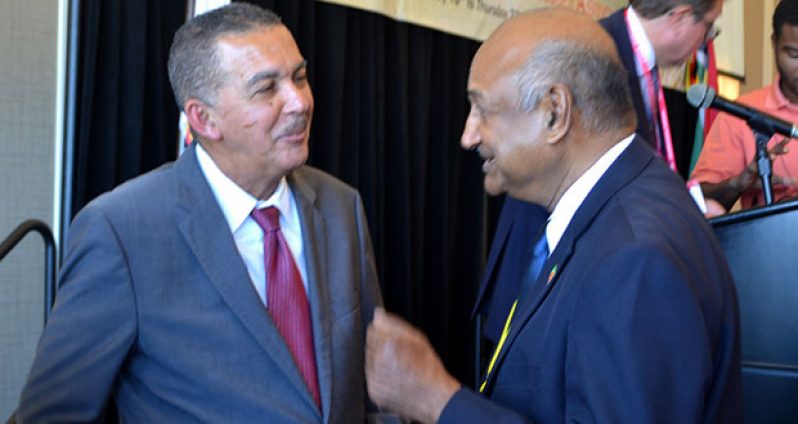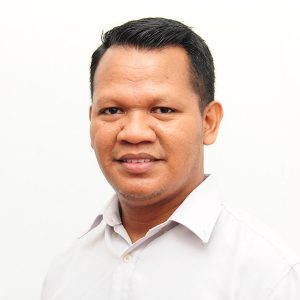…TT President plugs mediation to help unburden system
TIMELY delivery of justice must be a matter of priority for every judiciary across the globe; and mediation, as well as dispute resolution in cases, is seen as an effective measure of unburdening the delay in judgments.This was asserted by the President of Trinidad and Tobago, His Excellency Anthony Carmona, on Tuesday morning when he addressed delegates currently attending the Commonwealth Magistrates’ and Judges’ Association (CMJA) conference at the Marriott Hotel in Kingston, Georgetown.
In his keynote address to the legal luminaries, President Carmona said: “The cries of delay are not unique to any one corner or region of the Commonwealth.” He said the legal system is simply overwhelmed and suffers from a human capacity deficit. He termed delay “a cancer which starves the system of relevance and respect.”
The former Judge in the Supreme Court of Trinidad and Tobago noted that some jurisdictions have employed the use of mediation, and alternatively dispute resolution in cases which qualify. He described the move as a step in the right direction, since it aids the court in the disposition of cases and thus unburdens the backlog of cases.
He called for judgments to be written in an easily understood manner, with public perception in mind, and he called for cultivation of healthy relations between the bar and the bench.
President Carmona explained that a judge does not give interviews regarding his judgments, even if they are the subject of “great criticism in the common law tradition”. In those circumstances, he said, the role of the law or bar association is critical in taking up the mantle of communicating in public the effects of the meaning of the judgment “in circumstances where the judiciary should not be placed in a position where it has to defend itself or seem that way. This implies that the relation between the bench and bar must always be cultivated”, he said.
He said that one way of meeting the demands of the legal system is by continued education and training, which he noted is mandatory. To support his position, he said Trinidad and Tobago Chief Justice, Ivor Archie, stated at the beginning of that nation’s 2015/2016 law term that “it is accepted international best practice in developed societies for judiciaries to have continuous training in order to maintain relevance and effectiveness”.
He added that in Trinidad and Tobago there exists a lecture series, which he described as informed and said is available in print for public consumption and adjudication. He said the lecture series brings fresh life into the judiciary’s conduct, and it ensures that judges, lawyers and magistrates are apprised of new developments in the rule of law in a practicable manner.
Speaking on the demands of the legal profession, President Carmona noted that the judiciary should engage more in courses, in order to be more effective on matters which are brought for adjudication in the courts. He explained that China and the United States of America recently signed onto the Paris Agreement on climate change; and combined, those two nations are responsible for 40% of the greenhouse emissions globally.
He said that in order for the agreement to have full impact, it must be signed by those countries which are responsible for 55% of emissions.
In another instance, he informed that in the case of West Virginia versus the Environmental Protection Agency (EPA), some law students have challenged the Paris Agreement in that it can be derailed by a federal court of law.
“This is so because the sitting companies will be affected by the sanctions and dictates placed upon countries by the Paris Agreement,” he said, adding that legal practitioners will be forced to engage individual rights against collective rights. He said that such environmental matters are an area in which the legal profession should challenge itself in terms of educational awareness.
During his address, President Carmona also spoke of the impact of the Internet Age on the judicial system. He said the Internet and social media challenge the development of law, since they impact the laws of privacy and contract law, and he questioned whether it is related to the law of trespass. He said the judiciaries in many small-island jurisdictions have not been very progressive or timely as regards the Internet and social media development.
”At times judges have to raise from the dead archaic laws”, he said, as he noted the case — several months ago — of Theresa Hope versus Lendl Simmons, the West Indian cricketer, which centred on nude pictures being circulated. Hope claimed, inter alia, damages to breach of confidence, and she succeeded and was awarded aggravated damages. President Carmona noted that the presiding judge said in his judgment that the common law concept of breach of confidence was never applied in the Trinidad and Tobago courts.
The conference concludes on Thursday, and presentations will focus on a number of areas, including the balancing of anti-terrorism legislation with the people’s human rights; environmental law, and sustainable development among other matters.




.png)









